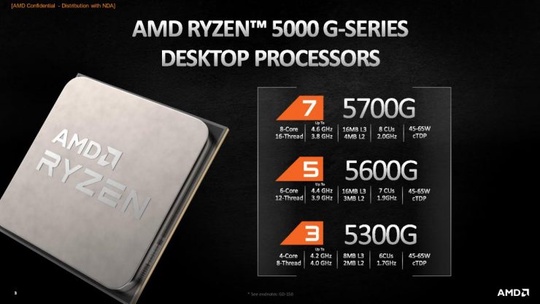AMD's Ryzen 3 5300G, the company's most entry-level Cezanne Desktop APU with a quad-core design, has been overclocked to an amazing 5.6 GHz using LN2 cooling. APISAK spotted the CPU validation, which demonstrates the Zen 3 core architecture's considerably increased overclocking capabilities.
AMD Ryzen 3 5300G Overclocked to 5.6 GHz on LN2 Cooling, Zen 3 Cezanne Desktop Quad-Core Showcases Its Power
AMD just introduced their Ryzen 5000G Desktop APUs for the DIY market, although the range only includes the Ryzen 7 5700G and the Ryzen 5 5600G. The Ryzen 3 5300G was not announced for DIY, and AMD provided no explanation. The chip, as an entry-level quad-core, could have been ideal for cheap builds, but the overclocking capability would have made it much more popular.
According to a CPU-z validation database entry by user 'Yosaarianilives,' the AMD Ryzen 3 5300G was overclocked to an insane 5.6 GHz. ASUS ROG STRIX B550-I Gaming was the motherboard used. The validation can be seen here:

APU 5300G 4 Core Cezanne Zen 3 Desktop:
The AMD Ryzen 3 5300G is a pretty standard APU with four cores and eight threads. The chip has a base clock frequency of 4.0 GHz and a boost clock frequency of 4.2 GHz. The APU has an L3 cache of 8 MB and an L2 cache of 2 MB. The Ryzen 3 5300G Vega iGPU configuration includes 6 Compute Units or 384 stream processors. The TDP of the chip is 65W. The 35W Ryzen 3 5300GE has the same specs as the 35W Ryzen 3 5300, but with lower core rates of 3.6 GHz base and 4.2 GHz boost.
AMD Ryzen 5000G Cezanne Zen 3 Desktop APUs
| CPU Name | AMD Ryzen 3 5300GE | AMD Ryzen 3 PRO 5350G | AMD Ryzen 3 5300G | AMD Ryzen 5 5600GE | AMD Ryzen 5 PRO 5650G | AMD Ryzen 5 5600G | AMD Ryzen 7 5700GE | AMD Ryzen 7 PRO 5750G | AMD Ryzen 7 5700G |
|---|---|---|---|---|---|---|---|---|---|
| CPU Architecture | Zen 3 | Zen 3 | Zen 3 | Zen 3 | Zen 3 | Zen 3 | Zen 3 | Zen 3 | Zen 3 |
| Cores / Threads | 4/8 | 4/8 | 4/8 | 6/12 | 6/12 | 6/12 | 8/16 | 8/16 | 8/16 |
| Base Clock | 3.60 GHz | 4.00 GHz | 4.00 GHz | 3.40 GHz | 3.90 GHz | 3.90 GHz | 3.20 GHz | 3.80 GHz | 3.80 GHz |
| Boost Clock | 4.20 GHz | 4.20 GHz | 4.20 GHz | 4.40 GHz | 4.40 GHz | 4.40 GHz | 4.60 GHz | 4.60 GHz | 4.60 GHz |
| L3 Cache | 8 MB | 8 MB | 8 MB | 16 MB | 16 MB | 16 MB | 16 MB | 16 MB | 16 MB |
| L2 Cache | 2 MB | 2 MB | 2 MB | 3 MB | 3 MB | 3 MB | 4 MB | 4 MB | 4 MB |
| iGPU | Vega 6 | Vega 6 | Vega 6 | Vega 7 | Vega 7 | Vega 7 | Vega 8 | Vega 8 | Vega 8 |
| iGPU Clock | 1.7 GHz | 1.7 GHz | 1.7 GHz | 1.9 GHz | 1.9 GHz | 1.9 GHz | 2.0 GHz | 2.0 GHz | 2.0 GHz |
| TDP | 35W | 65W | 65W | 35W | 65W | 65W | 35W | 65W | 65W |
| Price | $159 US? | $159 US? | $159 US? | $259 US | $259 US | $259 US | $359 US | $359 US | #359 US |
Again, the AMD Ryzen 3 5300G will be a really exciting chip because it has already shown to be the fastest quad-core CPU on the market (OEM sample numbers). We can't say for sure, but we expect it to be included in the DIY portfolio at some point in the future.


No comments yet